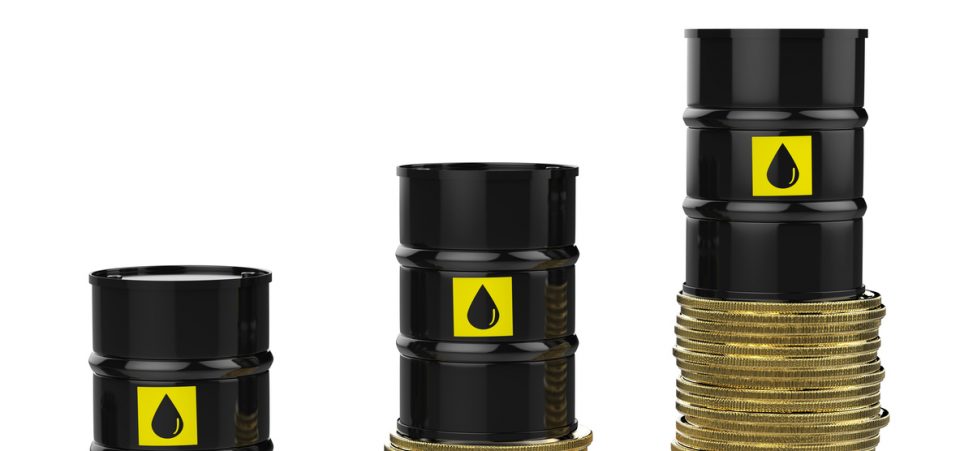The Factors Causing a Higher Oil Price Are Hurting Growth Around the World
Emerging markets are becoming increasingly nervous. The sudden rise of the U.S. dollar has caught many economies off guard. But a higher oil price is even more damaging.
This has been especially the case for the “emerging markets.” Argentina and Turkey, in particular, have been forced to raise interest rates significantly to stave off speculative pressure.
The nervousness rising in emerging markets is not just coming from the dollar. The oil price has become a problem as well. It’s a double-edged problem, as explained below (Saudi Arabia’s Saudi Aramco initial public offering (IPO) plans notwithstanding). (Source: “Saudi Exchange Welcomes Aramco IPO says CEO,” CNBC, May 2, 2018.)
A Dangerous Tandem of Higher Oil Prices and Rising Dollar
The Aramco IPO might help explain why the dollar is moving higher in tandem with the oil price. The latter has now reached the edge of $80.00 a barrel.
The higher oil price might make shale producers competitive. But, considering that the oil price per barrel was only $26.00 in February 2016, what’s good for Saudi Arabia and Texas might not be as good for the rest of the world economy.
Indeed, the combination of a rising oil price and a high dollar are fueling an already volatile mix at the global level.
The Iranian leadership has demanded concrete steps from the European Union (EU) for Tehran to continue to honor the Joint Comprehensive Plan of Action (JCPOA), also known as the “Iran Deal.”
Iran’s Supreme Leader, Ayatollah Khamenei has threatened to pull out of the Iran Deal—which allows for highly intrusive inspections into its nuclear facilities—unless the Europeans continue to buy Iranian oil. (Source: “Europe must buy our oil’: Iranian leader lays out femands for Europe to keep nuclear deal,” RT, May 24, 2018.)
As much as Europe will try to keep its commitment to the Iran Deal, it faces economic pressure from the United States. Arrangements to pay for the oil in euros might work.
Another Recession in Europe?
Many companies, having several interests in the United States, will not have an easy transition. Europe has not been able to take advantage of the cheap euro to sell more goods in the U.S. market. The Iran Deal will make this situation even more untenable.
This means oil prices will remain high for some time. And the European economy has already started to feel the weight.
European stock exchanges appear to have entered a bearish phase. The uncertainty resulting from Italy’s difficulties in forming a new government after a complicated election result on March 4 could give way to a menace for the euro and the EU.
As if high oil prices and the high dollar weren’t problematic enough, there are brewing tensions in Asia-Pacific between the United States and the fast-rising superpower of China.
China’s Ready to Take Over From EU
The Chinese energy giant CNPC will displace the European oil majors that have enjoyed Iran’s cheap-to-produce and abundant oil.
Companies like France’s Total SA and Italy’s Eni SpA may have to abandon Iran, despite the best efforts of the EU to uphold its end of the Iran Deal.
Total SA is leading the huge South Pars project. Why is that important? It happens to be the world’s largest known natural gas field. And natural gas is a big deal for the future of energy generation.
Regardless of what the solar energy or wind power enthusiasts claim, so-called renewable energy generation can work only if backed by an efficient and reliable fossil fuel source. Natural gas makes it all work better. It’s one of the key natural resources of the 21st century.
Yet, Total SA may have to pack up and leave this mighty resource. If that happens, CNPC is ready to take it over.
The EU Remains Vulnerable
Unlike the Europeans, the Chinese are better equipped to handle Trump’s plans. They are also less vulnerable.
CNPC does not operate in the United States. And it isn’t as susceptible to U.S. sanctions as conspicuously as are Total SA and Eni SpA. Thus, CNPC will simply take over Total SA’s end of the South Pars project.
China will take over Europe in a major resource that the whole world demands.
Won’t CNPC become a target of U.S. sanctions against Iran? Perhaps, but CNPC doesn’t have the vulnerability of the Europeans. If the European companies lose America, they might as well pack up. CNPC, meanwhile, has already tooled itself to operate in emerging markets.
The Black Swan Factor
Each one of the risks or issues cited above has the potential to trigger the kind of “tail risk” or “black swan” event that causes a global disaster.
Such a disaster, given the combination of factors, will not be circumscribed to a single geographic or economic zone.
The so-called Arab Spring or Arab Awakening was limited to the Middle East and North Africa. It certainly affected these regions, reaching into West Africa as well.
It also affected Europe, where a massive flow of refugees and migrants was significant enough to intensify the effects of the 2008 financial crisis and the Great Recession.
It also moved a so-called populist (or more accurately, anti-traditional powers) political tsunami that has led to unpredictable and unstable governments in some of the EU’s most populous countries.
These precarious governments will have to launch ambitious reform programs, even as the pillars of the global economy are crumbling around them.
The higher oil price is one of the main protagonists of this destructive tsunami.
Italy Is One of the Countries to Watch
Italy, dealing with the most intense effects of the migrant and refugee crisis, could drag down the whole EU in another recession.
Italy’s precarious economy is heavily reliant on export markets. Despite its current account deficits, Italy trails only Germany in the EU’s industrial output and value of exports.
So deep were the effects of the Great Recession that started in 2008 that Italy is one of the countries at risk of suffering a default that could crush the eurozone.
Iran was one of the strategies to boost exports. Italy was counting on some $30.0 billion in trade with Iran. Italy is one of Iran’s main trading partners. All its major industrial and energy groups have had a presence in Iran for years.
The Iran Deal was essential to Italy and, therefore, to Europe’s tenure.
The sanctions and the corresponding increase in oil prices simply threaten to reverse the economic growth trends with another recession. The situation is even more volatile because of the delicate trade situation and Trump’s shakeup of all existing trade agreements.
And Then There’s Venezuela
Closer to Washington, Venezuelans have re-elected Nicolás Maduro as president. He’s been a thorn in the side of U.S. interests in oil- and gas-rich Venezuela for years.
Maduro’s win means that the United States will intensify sanctions against that country. They would complement the sanctions already being applied against Iran. Together, they could end up shocking the global economy with another oil crisis.
Trump and Americans Have Nothing to Cheer About with a Higher Oil Price
The weakening competitors in a highly interconnected economy won’t work when oil prices are increasing faster than inflation and wages for everybody. It’s unclear how America benefits from higher oil prices.
Even if shale becomes competitive, the benefits are limited geographically and demographically. Most Americans will simply be paying some $10.00 more on average every time they fill up gas.
Does Trump Still Think the Iran Deal Was Bad?
The oil shock has been more intense because it comes from a period when oil prices were deemed excessively low. The low prices, it cannot be stressed enough, contributed to sustaining the economy. Now, the shock has already gone around the corner.
The oil price has once again moved into “too expensive” territory. All consumers in America, Europe, and elsewhere will have to endure negative effects. Of course, the negative effects will also fall upon many emerging markets, including India.
The emerging markets are already suffering from higher U.S. interest rates and the strong dollar. To an even greater extent than in 2013 or 2015, the Federal Reserve’s decision to cut its asset purchasing program will trigger capital outflows.
The rising U.S. Treasury yields, meanwhile, will force the Fed to raise interest rates. And, in a debt-fueled economy such as the one Wall Street sustains, the higher interest rates risk triggering a recession in the United States as well.






